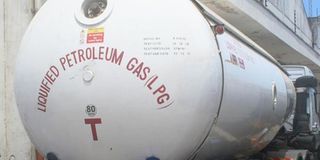How smuggled cooking gas may be finding its way into your kitchen

A truck waiting to be loaded with liquified petroleum gas. FILE PHOTO |
What you need to know:
- Illegal trade is conducted in collusion with corrupt customs and border officials.
- Whistleblower says LPG trucks are loaded in Dar with only part of the cargo being declared at the border.
A Tanzanian company in collusion with the Kenya Revenue Authority (KRA) and border police officers has been smuggling large volumes of untested cooking gas into the Kenyan market.
The Sunday Nation has established that more than 150 trucks loaded with 20,000 kilos of LPG pass from Tanzania through the Namanga crossing to Taveta monthly with only a quarter of the cargo being declared, denying the Kenya government revenue and endangering Kenyans.
The details have been availed to Sunday Nation by a whistleblower who has been importing LPG gas from Mihan Gas Company Limited of Tanzania.
“LPG is being loaded at Mihan Gas in Dar es Salam. They load 22,000 kilos per truck. They do not produce any weighbridge ticket and instead issue a hand-written manifest whereby they indicate volumes much lower that actual loaded,” the whistleblower said.
According to the bill of lading given to Sunday Nation by the whistleblower, of the 20,000 kilos only 12,540 kilos per truck were declared at the border in what is said to be a syndicate involving corrupt Kenyans working there.
“In this case, a truck that was loaded on March 4, 2015 with 20,000 kilos was given a written manifest that showed 12,540 kilos. We only paid VAT on 12,540 kilos and not on 20,000 kilos,” says the whistleblower.
The Sunday Nation contacted KRA who claimed that they were not aware of the issue and promised to investigate.
“KRA does not condone tax evasion in whichever form and has put in place structures to protect government revenue. To this end, we are not aware of such a malpractice.
“However, in the spirit of mutual co-operation between KRA and the media, we shall treat this as a lead and investigate to establish the facts. Our Investigations and Enforcement team will treat this with utmost confidence to ensure a fruitful and speedy conclusion,” said Chief Manager, Corporate & Public Affairs Division Maureen Njongo.
EXPLODING CYLINDERS
Mihan Gas Managing Director Ferasat Reza did not respond to questions we sent to him on e-mail on Tuesday last week.
Last week, the Energy Regulatory Commission (ERC) Director of Petroleum Mr Linus Gitonga referred us to KRA.
“This issue has nothing to do with us,” said Mr Gitonga when we called his office landline.
There have been numerous cases of untested LPG gas cylinders exploding and maiming or killing people.
In December 2014, ERC embarked on a campaign to eradicate illegal filling stations and managed to close more than 25 of them.
“ERC will ensure that all positively identified illegal sites remain permanently closed in the interim as a more permanent solution to this problem such as demolition is sought. The commission will continue to partner with the LPG sector players, the national government, the county governments, and the public to stem out the malpractice,” says ERC Director General Joseph Nganga in a letter to Petroleum Institute of East Africa general manager Wanjiku Manyara.
Ms Manyara says seven of every 10 cylinders in Kenya have been refilled illegally. She also said they have established that the illegal LPG filling stations were being supplied by illegally imported gas.
Ms Manyara confirmed the tax evasion scheme by importers and Kenyan border control officers is conducted at Namanga border where they allow untested LPG to be shipped to Kenya.
“This is done through re-using the import document (so one entry with one volume for one truck is used then the same form is used to clear smuggled truckloads of LPG). You will find photoshopped customs documents, payment receipts,” says Ms Manyara.
“Government loses millions per month in tax/levies collections. These smuggling trucks are usually released around 6.30p.m. to 7.30p.m. using reused/previous entries and this can be confirmed through the rotation books at receiving desk, customs, and police gates and via the physical verification of customs documents accompanied by the trucks which only travel at night,” says Ms Manyara.




